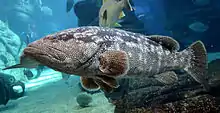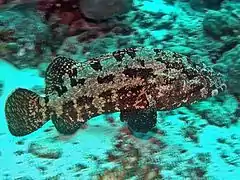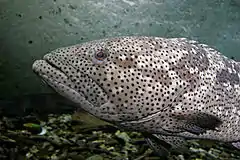Malabar grouper
The Malabar grouper (Epinephelus malabaricus) also known as blackspot rockcod, estuary rockcod, giant rock cod, greasy grouper, Malabar rockcod, Morgan's cod or speckled grouper, is a species of marine ray-finned fish, a grouper from the subfamily Epinephelinae which is part of the family Serranidae, which also includes the anthias and sea basses. It is found in the Indo-Pacific region. It has entered the Mediterranean Sea from the Red Sea by way of the Suez Canal as a Lessepsian migrant.
| Malabar grouper | |
|---|---|
 | |
| Epinephelus malabaricus in uShaka Marine World | |
| Scientific classification | |
| Kingdom: | Animalia |
| Phylum: | Chordata |
| Class: | Actinopterygii |
| Order: | Perciformes |
| Family: | Serranidae |
| Subfamily: | Epinephelinae |
| Tribe: | Epinephelini |
| Genus: | Epinephelus |
| Species: | E. malabaricus |
| Binomial name | |
| Epinephelus malabaricus | |
| Synonyms[2] | |
| |
Distribution and habitat
The Malabar grouper is widespread throughout the tropical waters of the Indo-West Pacific area from the eastern coast of Africa to the Tonga Islands, Red Sea included.[2][1] It has also been recorded in the Levantine Sea and the eastern Mediterranean, as a Lessespian migrant through the Suez Canal, although it is still rather rare in the Mediterranean.[3] This grouper lives in various habitats, such as lagoons, mangroves, coral and rocky reefs, sandy and muddy bottom areas,[4] between 2 and 150 m deep.[5] The juveniles prefers lagoon or brackish areas.[4]
Description
The Malabar grouper can reach a length up to 234 cm (92 in), but average size is usually around 100 cm (39 in).[6] It has a light grey to light brownish background color, with a number of dark brown spots randomly scattered, which increase in number with age. The body has also a various number of brown diagonal stripes. Younger fish have a number of wide, broken vertical bands of darker shade across their bodies, but in maturity they seem to become a uniform darker colour. Young fish have numerous brown spots. The tail fin is rounded.[7]
Biology
Epinephelus malabaricus is a protogynous hermaphrodite, as these fishes at some point in their lifespan change sex from female to male.[5] Malabar grouper are voracious predators, they feed on fish, crustaceans, and occasionally, cephalopods.[8]
Parasites
As most fish, the Malabar grouper harbours a variety of parasites, including the diplectanid monogeneans Pseudorhabdosynochus manifestus, P. maaensis, P. malabaricus, P. manipulus, P. marcellus, and P. maternus.[9]
Uses
Malabar groupers are harvested for food, sport, and commercially; some are grown in aquaculture.
Gallery
 Epinephelus malabaricus from Sudan Coast
Epinephelus malabaricus from Sudan Coast_(8502057283).jpg.webp) Epinephelus malabaricus from Sabah, Malaysia
Epinephelus malabaricus from Sabah, Malaysia Close-up
Close-up
References
- Samoilys, M.; Amorim, P.; Choat, J.H.; et al. (2018). "Epinephelus malabaricus". IUCN Red List of Threatened Species. 2018: e.T61338A46627320. doi:10.2305/IUCN.UK.2018-2.RLTS.T61338A46627320.en.
- Froese, Rainer and Pauly, Daniel, eds. (2019). "Epinephelus malabaricus" in FishBase. December 2019 version.
- "Epinephelus malabaricus". CIESM Atlas of Exotic Fishes in the Mediterranean Sea. CIESM. Retrieved 15 January 2017.
- van der Elst, R.P. and F. Adkin (eds.), 1991. Marine linefish: priority species and research objectives in southern Africa. Oceanogr. Res. Inst., Spec. Publ. No.1. 132 p.
- Heemstra, P.C. and J.E. Randall, 1993. FAO Species Catalogue. Vol. 16. Groupers of the world (family Serranidae, subfamily Epinephelinae). An annotated and illustrated catalogue of the grouper, rockcod, hind, coral grouper and lyretail species known to date. Rome: FAO. FAO Fish. Synop. 125(16):382 p.
- Fischer, W., I. Sousa, C. Silva, A. de Freitas, J.M. Poutiers, W. Schneider, T.C. Borges, J.P. Feral and A. Massinga, 1990. Fichas FAO de identificaçío de espécies para actividades de pesca. Guía de campo das espécies comerciais marinhas e de águas salobras de Moçambique. Publicaçao preparada em collaboraçao com o Instituto de Investigaçao Pesquiera de Moçambique, com financiamento do Projecto PNUD/FAO MOZ/86/030 e de NORAD. Roma, FAO. 1990. 424 p.
- Atlas of Exotic Species in the Mediterranean, CIESM – Mediterranean Science Commission.
- Lieske, E. and R. Myers, 1994. Collins Pocket Guide. Coral reef fishes. Indo-Pacific & Caribbean including the Red Sea. Harper Collins Publishers, 400 p.
- Justine, Jean-Lou, and Aude Sigura. "Monogeneans of the malabar grouper Epinephelus malabaricus (Perciformes, Serranidae) off New Caledonia, with a description of six new species of Pseudorhabdosynochus (Monogenea: Diplectanidae)." Zootaxa 1543 (2007): 1–44. Abstract
